Transferts monétaires et mobilité humaine
Les transferts monétaires sont souvent utilisés lors de crises afin de répondre aux besoins des personnes migrantes. Dans cette page, vous trouverez des ressources sur les transferts monétaires et la migration.

La Croix-Rouge se prépare à fournir une aide humanitaire aux migrant·es de la caravane sur le point de quitter le Honduras pour le Guatemala.
©Johannes Chinchilla / FICR.
Conflits, crises économiques et catastrophes sont autant de raisons ayant contraint des personnes à fuir et à traverser des frontières dans des conditions éprouvantes et risquées, en quête de sécurité et de moyens de subsistance. En 2020, le nombre de personnes déplacées de force s’est envolé au niveau sans précédent de plus de 80 millions de personnes, soit près du double du nombre enregistré il y a une dizaine d’année. Cette tendance s’aggrave et les effets du changement climatique menacent de déplacer jusqu’à 200 millions de personnes d’ici 2050.
L’assistance monétaire est de plus en plus utilisée afin de répondre aux besoins des personnes en situation de déplacement. On y a eu recours à grande échelle dans différents contextes de migration, en Europe en 2015 jusqu’au Venezuela pour « los caminantes ». Elle a également été utilisée dans d’autres crises migratoires, notamment en Amérique centrale, au Sahel, en Méditerranée et dans la Corne de l’Afrique. L’assistance monétaire est à l’heure actuelle l’une des principales formes d’aide apportée aux populations déplacées en Ukraine et dans les pays voisins.
Il existe une myriade de perspectives et de définitions concernant le mot « migrant·e » et la façon dont les humanitaires doivent agir. C’est pourquoi nous ne choisissons pas une définition unique pour le moment, étant donné que les discussions sur l’assistance monétaire et la migration en sont encore à leurs prémices et que le langage évolue encore.
Documenter et partager les données probantes donnera lieu à des interventions plus efficaces. Cette page contient une sélection de ressources utiles concernant la migration et le recours à l’assistance monétaire. Elle sera mise à jour au fil des discussions ayant lieu dans les espaces humanitaires des transferts monétaires.
Priorités actuelles
Afin de contribuer aux progrès relatifs à cet enjeu, nous nous engageons à :
- soutenir la création de données probantes aux niveaux régional et mondial ;
- contribuer aux solutions pratiques visant à mettre en œuvre les transferts monétaires auprès des personnes migrantes ;
- organiser des discussions sur les enjeux majeurs basées sur des données probantes.
Contenu récent
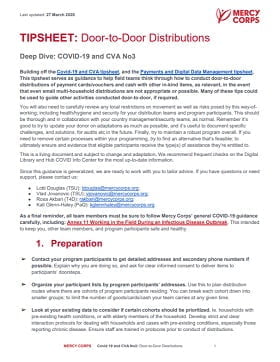
Mercy Corps Tipsheet No 3: Door to Door Distributions
Guidelines and Tools
Mercy Corps Tipsheet No 3: Door to Door Distributions
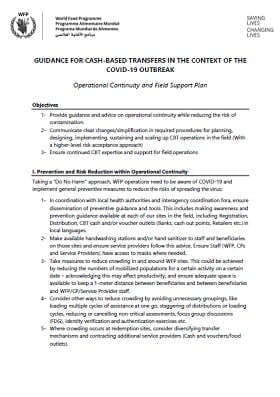
WFP – Guidance for Cash-based Transfers in the Context of the Covid-19 Outbreak
Guidelines and Tools
The objectives of this document are:
1- Provide guidance and advice on operational continuity while reducing the risk of contamination.
2- Communicate clear changes/simplification in required procedures for planning, designing, implementing, sustaining and scaling up CBT operations in the field (With a...

Cash and Voucher Assistance and the Covid-19 Outbreak, Syria
Guidelines and Tools
This documents intents to provide guidance and advice on how to best adapt Cash and Voucher Assistance (CVA) programming during the current Covid-19 outbreak and specifically how to manage CVA during the outbreak and how to operate while reducing the risk of contamination
This document is a compilation of...
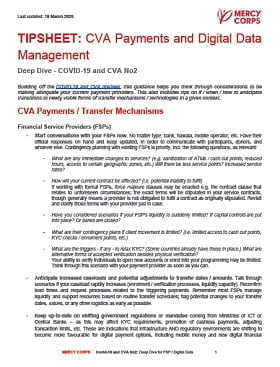
Mercy Corps Tipsheet: CVA payments and digital data management
Guidelines and Tools
Building off the COVID-19 and CVA tipsheet , this guidance helps you think through considerations to be making alongside your current payment providers. This also includes tips on if/when/how to anticipate
transitions to newly viable forms of transfer mechanisms/technologies in a given context.
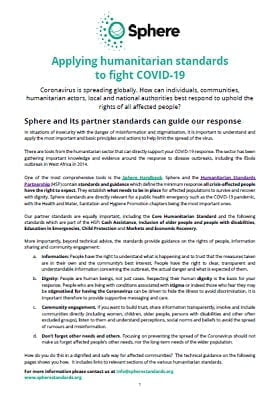
Sphere: Humanitarian Standards and Coronavirus 2020
Guidelines and Tools
Coronavirus is spreading globally. How can individuals, communities,
humanitarian actors, local and national authorities best respond to uphold the rights of all affected people?

ICRC – Implications de la pandémie COVID-19 sur les transferts monétaires : Conseils et recommandations
Guides et outils
Cette liste de recommandations sert à aider les équipes terrain à réfléchir aux différentes manières d’:
1) éviter que nos transferts monétaires contribuent à propager le COVID-19 ;
2) orienter l’adaptation de nos transferts monétaires dans le cadre de la pandémie COVID-19;
3) anticiper...
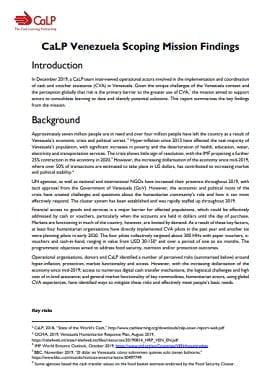
The CALP Network Venezuela Scoping Mission Findings
Report
In December 2019, a the CALP Network team interviewed operational actors involved in the implementation and coordination of cash and voucher assistance (CVA) in Venezuela. Given the unique challenges of the Venezuela context and the perception globally that risk is the primary barrier to the greater use...

CVA and Gender in West and Central Africa
Event

Presentation of the Draft of the CALP Network’s 2020+ Strategy (Americas/Europe/Africa time zones)
Webinar

Presentation of the draft of the CALP Network’s 2020+ strategy (East Africa/MENA/Asia Pacific time zones)
Webinar

Mercy Corps Tipsheet: COVID-19 and CVA
Guidelines and Tools
This tipsheet serves as guidance to help field teams think through different ways to mitigate the spread and impact of Covid-19 through ongoing cash and voucher assistance (CVA), inform the adaption of CVA programming in the context of Covid-19, and promote sensitivity to changing market dynamics and...

Webinaire : Présentation de l’ébauche de la stratégie 2020+ du CALP Network
Webinaire
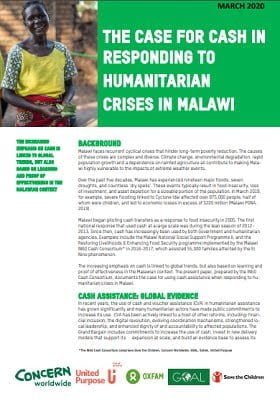
The Case for Cash in Responding to Humanitarian Crises in Malawi
Policy paper
A policy paper by the Malawi INGO Cash Consortium which makes the case for cash assistance as a response modality to humanitarian crises. It gives a brief overview of global evidence for cash and previous cash experience in Malawi, and makes several key recommendations. One of these key recommendations is...

Core CVA Skills for Programme Staff
Training
The Core CVA Skills for Programme Staff course is a 5-day training for programme staff responsible for designing, implementing and monitoring cash and voucher assistance.

East and Southern Africa Cash Working Group Leads meeting
Event

The Potential Mortality Effects of Physical Currency
Policy paper
The extent to which banknotes may or may not play a direct role in ‘the chain of communicable disease transmission’ has been questioned during the Covid-19 response. Whether they do or they don’t is perhaps less relevant than the belief among ‘at risk’ populations that they do. And this belief...

Cash Working Group Leads Meeting Report – March 2020
Report
The Cash Working Group leads/co-leads meeting is a forum intended to provide a space for reflection, peer learning and developing solutions to shared challenges. This year’s meeting agenda and content were guided by requests from and contributions by participants. This report summarizes the discussions...

Documentation de l’influence des transferts monétaires sur les normes et dynamiques de genre
Rapport
En février 2018, le CALP Network est ses partenaires ont organisé à Nairobi un symposium sur les transferts monétaires (TM) et le genre. Cette conférence a réuni des acteurs humanitaires et chercheurs travaillant sur ces thématiques dans différents contextes du continent africain, et a abouti à...

Plan International: COVID-19 Adaptations to Cash and Voucher Assistance (CVA) Interventions
Guidelines and Tools
The aim of this technical guidance is to support the team in designing and implementing Cash & Voucher Assistance (CVA) programmes in both development and humanitarian settings to adapt interventions in response to the Covid19 outbreak, in order to:
1. Support adequate prevention and response to Covid19,...

FAQ pour la communauté de pratique sur les marchés en crise
Guides et outils
La communauté de pratique sur les marchés en crise (MiC) comprend près de 2 000 personnes ayant un degré d’expérience variable dans le domaine de l’analyse de marché et de la programmation basée sur les marchés. Les membres sont invités à partager dans le groupe de discussion Dgroup toutes...